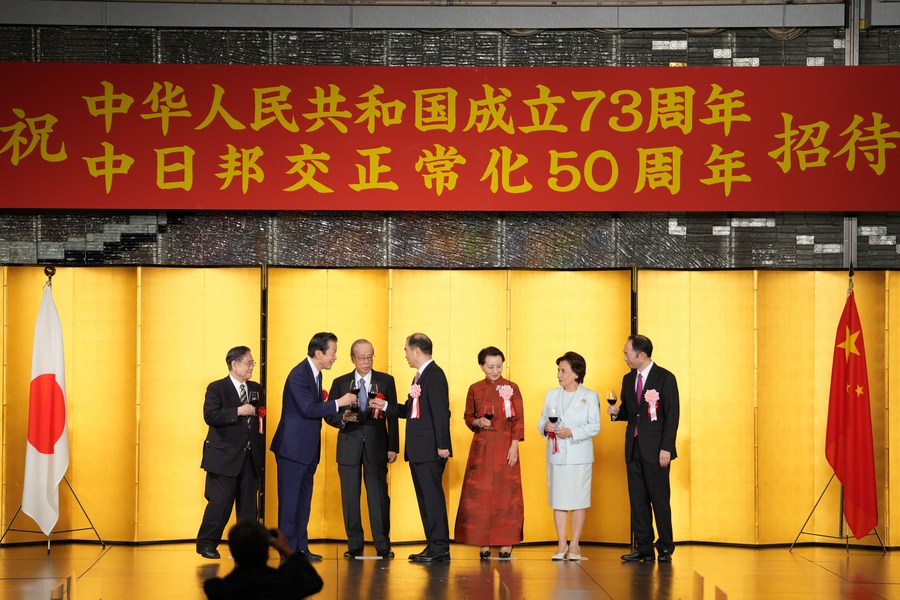Interview: Mutual trust, mutual benefit should be mainstream of Japan-China relations -- former Japanese FM

A reception is held by the Chinese embassy in Japan to celebrate the 73rd anniversary of the founding of the People's Republic of China (PRC) and the 50th anniversary of the normalization of diplomatic relations between China and Japan in Tokyo, Japan, Sept. 22, 2022. (Xinhua/Zhang Xiaoyu)
TOKYO, Sept. 25 (Xinhua) -- Japan and China should consolidate mutual trust, adhere to mutual benefit, and seek common ground while reserving differences, which represents the mainstream of Japan-China relations, former Japanese Foreign Minister Makiko Tanaka told Xinhua in a recent interview.
On Sept. 25, 1972, the then Japanese Prime Minister Kakuei Tanaka visited China. On Sept. 29, the Chinese and Japanese governments issued the Sino-Japanese Joint Statement, normalizing the diplomatic relations between the two countries and opening a new page in bilateral relations.
On the occasion of the 50th anniversary of the normalization of China-Japan diplomatic relations, Makiko Tanaka, 78, also daughter of late Kakuei Tanaka, shared her memories of the historic moment.
"My father said that Japan must establish good relations with China, but Japan had launched a war of aggression against China. My father always said that the first thing to do with China is to apologize. War only leaves hatred," Tanaka recalled.
Since Kakuei Tanaka was first elected to the Diet, China had not left his mind, she said. "In my father's opinion, relationship with China was a fundamental issue in Japanese politics, and it was impossible to talk about Japanese politics without mentioning China."
In July 1972, after Kakuei Tanaka was appointed prime minister, he began to signal a change in policy toward China. He paid a visit to China from Sept. 25 to 30.
Tanaka said the weather was very good on the day of her father's departure to Beijing; there were many people in and out of her family's house, with media helicopters circling overhead.
"My son was running around the courtyard, and my father picked him up and asked, 'Beijing is in which direction?' My son pointed, 'over there.' Father squeezed his face and said, 'grandfather is going over there; let's have dinner together again when I come back,'" she said.
In 1992 when Kakuei Tanaka was in the recovery period after a major stroke, Tanaka accompanied her father on another visit to China, and were welcomed by the Chinese side with warm hospitality. The accommodation was arranged in the same room where Kakuei Tanaka stayed during his 1972 visit.
"My father was very emotional when he saw all that. He remembered it vividly and was deeply moved. He was very aware of the considerate and meticulous care of the Chinese government," she added.
Kakuei Tanaka passed away in December 1993. Tanaka remembered her father was nearly unable to speak and had to rely on writing in his final days, and he always believed the normalization of Japan-China diplomatic relations played an important role in Japan's post-war revival.


